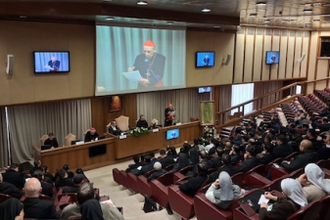George Monbiot: 'Heat - How to Stop the Planet Burning'
George Monbiot "Heat: How to Stop the Planet Burning (London: Allen Lane, Penguin, 2006)ISBN-13: 978-0-713-99923-5
This book analyses the ways in which the UK, a typical medium-sized industrial nation, can reduce its carbon dioxide production by 90% by the year 2030. This is needed in order to help stabilise the carbon dioxide concentration in the atmosphere at a level somewhat above the present value. This should prevent a catastrophic run-away in the temperature of our world, although even with a fixed level of carbon dioxide the earth will continue to warm until it reaches its final average temperature, a couple of degrees Celsius higher than at present.
It may seem a little odd to review the topic of global warming on a Christian website, but it must be pointed out that this is an issue of life-and-death significance for everyone, which needs a high level of reasoned debate, and probably some very serious action. We comfortable Christians in the West may be morally obliged to revive the ancient tradition of fasting and ascetic living, not so much because it will make a substantial difference in itself, but because it should set an example of abstinence, and show up the absurdity of the excessive consumption we have today. But I have to admit that my first response to this topic is much the same as when I see a man with a sandwich-board announcing that the end of the world is nigh. Maybe I say, but things seem to go on pretty well as usual, and with any luck it won't be in my time!
The 90% figure is based on the idea that our carbon dioxide production is ten times higher than the averaged permissible production per person. Thus poorer nations would not be so severely restricted. But once Monbiot has set his target, he shows how it is just about possible to achieve it in this country. (He does consider the politics, but I have to confess I believe he is a little optimistic. We would need a war psychology, with everyone united and ready to sacrifice themselves in the face of a deadly common foe.)
The first chapter points out that there is a strong consensus on the issue of global warming among atmospheric scientists. The author also discusses some symptoms and likely consequences, which will not be pleasant. He makes an amusing parallel with the story in Marlowe's Faustus, where the devil's agent Mephistopheles offers Faust magical powers to enable him to "live in all voluptuousness." But this is just for twenty-four years, after which he, Faust, must burn in hell for eternity. Here Faust stands for the human race (more precisely the rich part of the human race) and Mephistopheles for hydrocarbon fuels. (Perhaps we should also note Jesus's story of the rich man and the beggar Lazarus, in which the rich man lives in great luxury for a while, before being buried in hell.)
Chapter 2 deals with people who deny that global warming is happening. The examples quoted show idiocy at its worst. Thus a campaign to deny that passive smoking is harmful has been adapted to deny that high levels of carbon dioxide are harmful. I feel that the author has selected the more idiotic aterial and there must be some scientists among the deniers with genuine objections. However, unlike the author, I have not had to do battle with the denial industry, which is backed by powerful lobbies.
Subsequent chapters discuss a variety of topics, mostly the obvious but vital ones. Thus we have chapters on rationing, domestic heating, power generation, road and rail transport, air transport, and supermarkets. Four points especially struck me. Firstly, in order to get anywhere near the target, government regulation is needed. At the moment, if I make a journey by bicycle or bus rather than by car, I am simply vacating road space for another car. Secondly, our homes are abysmally insulated because of poor and poorly enforced building codes over the years. An immediate consequence is the threat of hypothermia to pensioners this winter.
Thirdly, "carbon capture" seems to be a viable concept: Carbon dioxide produced by burning oil or coal in power-stations is captured and then buried in old oilfields or aquifers. But since these emptied locations have held their contents for millions of years until now, presumably they would hold carbon dioxide in a perfectly reliable manner. Fourthly, there is no way of seriously reducing the amount of carbon dioxide produced by air travel except by severely curtailing its use. Fortunately at the moment it is used only by a minority of the earth's population, but just imagine what would happen if everyone flew half-way round the globe for their holidays. (Perhaps European pilgrims should be persuaded to visit European shrines by bus or train rather than by air, even though this would only be a token gesture because of the first point made above.)
It is a brilliantly researched book, with a large bibliography, lots of statistical information, and written with passion and wry humour. Evidently a lot of hard work has gone into it. There is also a list of campaigning organisations. I would heartily recommend it as a Christmas present, though it may make some people choke on their turkey! The reader should be prepared to be sufficiently numerate not to baulk at large quantities, such as the total annual production of electricity of this country in kilowatt hours, or the amount of carbon dioxide released into the atmosphere every year.
The author is a journalist rather than a scientist, and so for further reading providing a more technical treatment on a global scale I recommend Sir John Houghton's book "Global Warming: The Complete Briefing" with a third edition out in 2004. Significantly this book is dedicated to its author's grandchildren and their contemporaries.
first published LONDON - 14 December 2006 - 985 words















